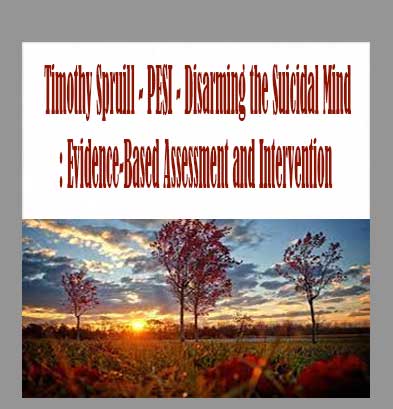Description
Timothy Spruill – PESI – Disarming the Suicidal Mind: Evidence-Based Assessment and Intervention download, Timothy Spruill – PESI – Disarming the Suicidal Mind: Evidence-Based Assessment and Intervention review, Timothy Spruill – PESI – Disarming the Suicidal Mind: Evidence-Based Assessment and Intervention free
Timothy Spruill – PESI – Disarming the Suicidal Mind: Evidence-Based Assessment and Intervention
From Triage to Tomorrow Suicide deaths have increased dramatically in recent years to 40,000 Americans annually, a leap that has been attributed variously to the Great Recession, wars in Iraq and Afghanistan, and access to guns and prescription pain killers – but what about medical error? Thirty-nine percent of suicide completers have been seen in an ER within the past year (many for mental health complaints and self-harm), while 59% of ER patients with injuries from deliberate self-harm do not receive a psychiatric assessment. Despite these trends, graduate training in assessment of imminent self-harm is often limited, offering little practical experience in counseling labs due to intake policies designed to avoid liability.
This recording offers a revealing look inside the complex and rapidly expanding knowledge-base concerning the epidemiology of suicide and self-harm, while exploring the most effective measures you can take to save your patients’ lives. Learn to recognize risk factors associated with suicide attempts, as well as long-term and imminent warning signs, and accurately assess self-harm and suicide risk. Discover evidence-based interventions and explore the challenges of treatment across populations, including patients with addictive behaviors. Finally, we will deconstruct the emergency mental health protocols of today and identify common thinking errors leading to diagnostic and intervention mistakes that actually worsen crisis situations.
Speaker
Timothy Spruill, MA, EdD
Timothy Spruill, MA, EdD, has conducted more than 3,500 emergency psychiatric assessments in one of Orlando’s busiest emergency departments as a consultant at Advent Health, where he is a founding faculty member of the emergency medicine residency program. Through his work with high-risk patients and his research in the area of suicidology, Dr. Spruill has developed an evidence-based approach to emergency mental health that urges progress far beyond the fragile gains of traditional (and contemporary) psychological triage.
His extensive experience conducting assessments and evaluations reaches back to his work in private psychiatric hospitals in the early 1980s. Dr. Spruill earned his Master’s degree in counseling psychology from George Mason University in 1977. After four years of teaching, he left for the applied world of a community psychiatric setting and pursued his Doctorate in counseling psychology at Western Michigan University. In addition to his ongoing consulting work, he returned to academia in 1991 to share his experience and extend his research capabilities. During his time with Andrews University and, subsequently, Advent Health, he has continued to collect data on suicide and conduct research in his chosen field of behavioral medicine. Since 2010, he has taught continuing education courses on the topics of suicide assessment, preventing medical errors, and violence. He has also presented his findings at numerous conferences, traveling as far as Cape Town, South Africa, to speak on suicide.
Speaker Disclosures:
Financial: Timothy Spruill is the founding faculty member of the Emergency Medicine Residency Program and has employment relationships with Loma Linda University School of Medicine, University of Central Florida, and Nova Southeastern University. He receives compensation as a national lecturer. Timothy Spruill receives a speaking honorarium and recording royalties from PESI, Inc. He has no relevant financial relationships with ineligible organizations.
Non-financial: Timothy Spruill is a member of the American Psychological Association, the American Association of Suicidality, and the Society of Teachers of Family Medicine.
Objectives
- Analyze the rapidly expanding knowledge-base concerning the epidemiology of suicide and self-harm as it relates to clinical practice.
- Recognize risk factors associated with suicide attempts, as well as long-term and imminent warning signs to improve client level of functioning.
- Articulate common assessment and clinical intervention errors that can be lethal.
- Identify ethical issues related to suicidal assessment and involuntary psychiatric commitment.
- Implement comprehensive assessment/intervention strategies to put to practical use in session.
- Overcome clinical challenges with suicidal clients to improve treatment outcomes.
Outline
INTRODUCTION TO THE GROWING PROBLEM OF SUICIDE IN AMERICA
- Need for concern: statistics revealing the increasing trend in suicidal ideation, attempts, deaths
- National data
- State-specific data
- Career risks for the professional counselor
- Factors contributing to the failure of adequate assessment and triage
- Inadequate training of physicians and professional counselors
- Inadequate funding for mental health (despite numerous parity laws)
- Shifting of the burden of assessment to emergency rooms
- Poorly trained law enforcement officers initiating involuntary admissions
EPIDEMIOLOGY — CONTRIBUTING FACTORS
- Risk factors
- Demographic risk factors (age, gender, ethnicity, etc.)
- Environmental risk factors (adverse childhood experiences)
- Addictions
- Mental illness
- Economic risk factors (employment)
- Warning signs
- Feeling alone—isolated from family/friends
- Feeling like a “burden” to others
- Little or no fear of death
- Red herrings
- Suicide notes
- Contingent suicide threats
- Cutting
- Pending divorce
- Limitations of the research and potential risks
ASSESSMENTS/MEASURES TO AID IN DETERMINING RISK LEVEL — A COMPREHENSIVE STRATEGY
- Mental status exam
- Collateral information
- Adults
- Relative lethality of plans/attempt (Risk/Rescue Scale)
- Hopelessness (Beck Hopelessness Inventory)
- Reasons for living (Brief Reasons for Living Scale)
- Adverse childhood experiences (A.C.E. Questionnaire)
- Teens and children
- Predictive/protective factors identified in the research
- Special populations
- Veterans
- LGBT
- Promising, novel methods for assessing risk
- Implicit cognitions—measuring implicit associations with death and suicide
COMMON INTERVENTIONS, MISTAKES, THINKING ERRORS & ETHICAL ISSUES
- Our natural tendencies to err
- Feelings of “rightness” are not reliable indicators
- External factors contributing to errors
- Internal factors contributing to errors
- Self-care is critical
- Two types of thinking (fast and slow)
- Dangers of lazy, “fast” associative thinking
- Substitution of easy-to-answer question for more difficult and complex question
- Type 1 vs. Type 2 errors (legal liability and ethical issues)
- Patient autonomy and self-determination
- Confidentiality limits
INTERVENTIONS AND TREATMENT PLANNING
- Non-judgmental, empathic listening
- Acknowledging reason for concern
- Taking advantage of ambivalence
- Evidence-based interventions to reduce subsequent suicide attempts
- DSM-5® new definitions and terminology
- Assess suicidal ideation at the start of every visit
- DSM-5 level one screening questionnaire
- Suicidal Behavior Disorder
- Non-Suicidal Self-injury
CHALLENGES TO ACHIEVING SUCCESSFUL TREATMENT OUTCOMES
- Means restriction
- Social support — supervision
- Follow-up counseling
- Exploring alternative responses should suicidal thoughts increase in frequency/intensity
WHEN LOSING A PATIENT TO SUICIDE — REMAINING RESILIENT AND MOVING FORWARD
Target Audience
- Psychiatrists
- Psychologists
- Social Workers
- Counselors
- Marriage and Family Therapists
- Psychiatric Nurses
- Case Managers
- Alcoholism and Drug Abuse Counselors
- Mental Health Administrators
- Educators
- Nurses
- Nurse Practitioners
- Pastoral Counselors
Frequently Asked Questions:
- Innovative Business Model:
- Embrace the reality of a genuine business! Our approach involves forming a group buy, where we collectively share the costs among members. Using these funds, we purchase sought-after courses from sale pages and make them accessible to individuals facing financial constraints. Despite potential reservations from the authors, our customers appreciate the affordability and accessibility we provide.
- The Legal Landscape: Yes and No:
- The legality of our operations falls into a gray area. While we lack explicit approval from the course authors for resale, there’s a technicality at play. When procuring the course, the author didn’t specify any restrictions on resale. This legal nuance presents both an opportunity for us and a boon for those seeking budget-friendly access.
- Quality Assurance: Unveiling the Real Deal:
- Delving into the heart of the matter – quality. Acquiring the course directly from the sale page ensures that all documents and materials are identical to those obtained through conventional means. However, our differentiator lies in going beyond personal study; we take an extra step by reselling. It’s important to note that we are not the official course providers, meaning certain premium services aren’t included in our package:
- No coaching calls or scheduled sessions with the author.
- No access to the author’s private Facebook group or web portal.
- No entry to the author’s exclusive membership forum.
- No direct email support from the author or their team.
We operate independently, aiming to bridge the affordability gap without the additional services offered by official course channels. Your understanding of our unique approach is greatly appreciated.
- Delving into the heart of the matter – quality. Acquiring the course directly from the sale page ensures that all documents and materials are identical to those obtained through conventional means. However, our differentiator lies in going beyond personal study; we take an extra step by reselling. It’s important to note that we are not the official course providers, meaning certain premium services aren’t included in our package:
Refund is acceptable:
- Firstly, item is not as explained
- Secondly, Item do not work the way it should.
- Thirdly, and most importantly, support extension can not be used.
Thank you for choosing us! We’re so happy that you feel comfortable enough with us to forward your business here.








Reviews
There are no reviews yet.